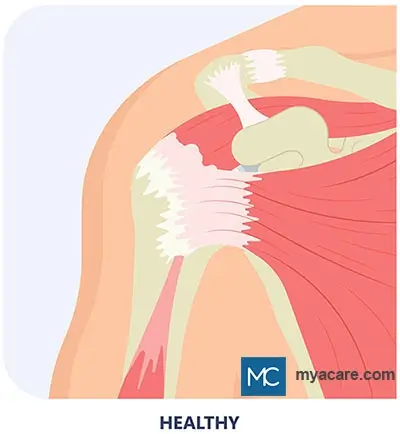Shoulder Replacement Surgery to Fix a Rotator Cuff Tear – Is It Required?

The shoulder joint, muscles, or shoulder bones can be damaged due to various reasons. Whether due to arthritis-related joint damage, a shoulder fracture, or a torn rotator cuff, your shoulder may need therapy to assure recovery. Is shoulder replacement surgery effective in treating any of these issues? Is it required and necessary?
In this article, we will discuss rotator cuff tear and shoulder replacement surgery in detail.
What Is a Rotator Cuff And Rotator Cuff Tear?
The rotator cuff comprises a group of muscles and tendons (a tissue that connects muscles to the bones). It holds our shoulder joint in place, helping to stabilize the shoulders. Moreover, it allows us to lift our arms and reach upward. A rotator cuff is an essential part of our shoulders.

A rotator cuff tear is a rip or crack in your rotator cuff (the muscles and tendons that help stabilize your shoulders).

What Are The Causes Of Rotator Cuff Tear?
There are two leading causes of rotator cuff tear:
- Injury
- Degeneration
1. Injury
An injury or activities involving excessive exertion can cause the shoulder muscles and tendons (the rotator cuff) to tear.
2. Aging
Degeneration of the tissues due to aging can also cause rotator cuff tears.
Symptoms of Rotator Cuff Tear
The symptoms of a rotator cuff tear can be similar to other medical conditions. So, it is important to consult a healthcare professional to confirm the diagnosis.
However, the major symptoms of a rotator cuff tear include:
- Pain in the shoulders
- Pain while performing day-to-day activities or tasks
- Pain at rest
- Shoulder tenderness
- Inability or difficulty in moving arms and shoulders
- Difficulty in raising arms
- Muscle weakness/arm weakness
- Pain and difficulty in sleeping on the affected shoulder side
- Cracking sounds while moving arms
- Difficulty in combing hair or reaching your back
- Shoulder pain that worsens at night
Diagnosis Of Rotator Cuff Tear
Your doctor may ask about your medical and physical activity history for an initial diagnosis of rotator cuff tear. To confirm the diagnosis, imaging tests such as an X-ray or MRI may be performed.
Treatment Of Rotator Cuff Tear
The treatment of rotator cuff tear depends on the intensity of your injury. If the damage is slight, it can be managed by conservative treatments such as NSAIDs, cold compresses, rest, and physical therapy. However, if conservative treatments or physical therapy are ineffective or the rotator cuff injury is severe, surgery may be needed.
Surgical Options For Rotator Cuff Tear
There are four different types of surgical options available for rotator cuff tear. The type of surgery to be performed depends on the intensity of damage and severity of the injury.
In arthroscopic tendon repair, the surgeon inserts a small camera (arthroscope) inside the rotator cuff. Then by visual imaging, they perform small incisions to reattach the broken tendon to the bone.
Unlike arthroscopic tendon repair, this procedure uses large incisions to reconnect the broken tendon to the bone. It is done when larger incisions are required to reattach the tendon to the bone.
A tendon transfer is a preferred option when the broken tendon of your shoulder is excessively damaged or completely torn and can not be reattached with the bone. It transfers and connects some other tendon of your body to the bone of your shoulders.
4. Shoulder Replacement Surgery
Complete or critical rotator cuff tear requires shoulder replacement surgery.
What Is Shoulder Replacement Surgery?
A shoulder replacement surgery, also known as shoulder arthroplasty, removes and replaces damaged areas of your shoulder with artificial metal and plastic implants. The artificial implants are called prostheses.
Complications from shoulder replacement surgery are rare. The 10-year survival rate of shoulder arthroplasty has been up to 90%. However, the complications can include loosening of the prosthesis, infection, pain, weakness, or the need for revision surgery.
Indications For Shoulder Replacement Surgery:
Shoulder replacement surgery is recommended in the following conditions:
- Rotator cuff tear arthropathy
- Osteoarthritis
- Rheumatoid arthritis
- Avascular necrosis
The procedure is done to relieve shoulder pain that is not manageable by non-operative treatments, improve shoulder strength, and increase the range of motion of your shoulder and arms.
Is Shoulder Replacement Surgery Effective For Rotator Cuff Tear?
Shoulder replacement surgery is the most effective surgery and established treatment for complete rotator cuff tear and end-stage glenohumeral osteoarthritis, especially for people who haven't shown improvement with non-operative therapies.
Should I Go For Shoulder Replacement Surgery? Is It Necessary And Beneficial?
Shoulder replacement surgery is an option when:
- Your pain is unbearable, and no therapy effectively relieves the pain.
- You can barely move your shoulder and arm.
- You have lost cartilages.
- Pain that continues even after taking medications like anti-inflammatory drugs or cortisone injections.
- You can't dress up by yourself.
If you are experiencing the above issues due to a rotator cuff tear or any other disease, shoulder replacement surgery may be necessary to relieve pain and manage the situation.
But, as the surgery uses artificial implants, you may not be able to move your shoulders as far as before. However, the surgery is effective in managing pain, restoring arm movement, and strengthening the arm. Usually, artificial shoulder joints last 10 to 20 years.
Types Of Shoulder Replacement Surgery
There are four types of shoulder replacement surgery performed depending on the patient's need.
1. Total Shoulder Replacement
Total Shoulder Replacement Surgery is done when both your humerus (ball of the upper arm) and scapula (socket of the shoulder blade) need to be replaced with artificial parts.
2. Partial Shoulder Replacement
Partial shoulder surgery replacement is done when only the humerus (ball of the upper arm) needs to be replaced with an artificial implant (prosthetic).
3. Reverse Shoulder Replacement
Reverse shoulder replacement is when the shoulder parts (humerus and scapula) are replaced to bypass the rotator cuff. In this surgery, the ball is attached to the shoulder blade, and the socket is added to the upper arm.
4. Shoulder Revision Surgery
As the name indicates, shoulder revision surgery is done to revise a previous shoulder replacement surgery. It can be done to correct previous surgical complications, post-surgical infections, or when the implant gets loose due to wear issues.
Conclusion
Shoulder replacement surgery isn't the first option to treat rotator cuff tears. It is usually recommended in severe cases.
At first, your doctor may go for non-operative therapies like physiotherapy, cold compresses, and NSAID medications to manage the condition. However, if the pain is unbearable and not manageable by other therapies, the next option is shoulder replacement surgery.
Shoulder replacement surgery has its benefits and drawbacks. It helps relieve the unbearable symptoms of rotator cuff tear to a great extent. But problems like infections, inability to move shoulders very far, or the need for shoulder revision surgery, while rare, can arise.
To search for the best Orthopedics Healthcare Providers in Croatia, Germany, India, Malaysia, Singapore, Spain, Thailand, Turkey, Ukraine, the UAE, UK and the USA, please use the Mya Care search engine.
Dr. Fatima Munir is a Doctor by profession, a freelance content writer, and a researcher. With a penchant for research, she diligently curates facts and the latest literature to guide readers on all matters of health.
References
Featured Blogs



